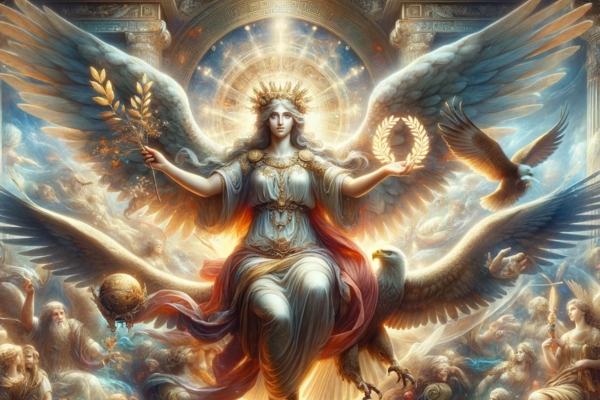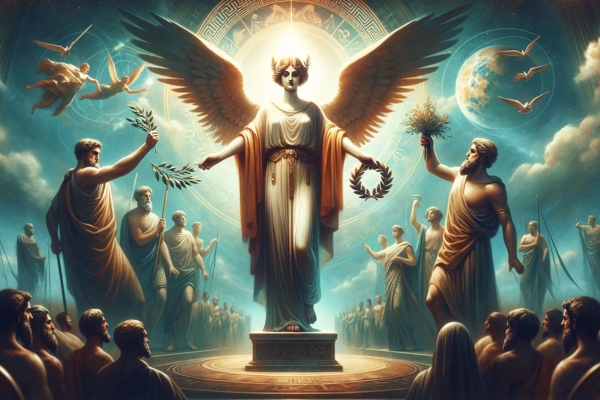Home » Powers of Nike the Greek Goddess: All Her Abilities Listed
Powers of Nike the Greek Goddess: All Her Abilities Listed
Before talking about all the Nike Goddess powers and otherworldly abilities, we need to get one thing clear upfront…
In Greek mythology, she is a full-fledged goddess.
She’s not a half-god nor a demigod like some people believe.
She is the daughter of the Titan Pallas and the nymph Styx, which makes her a divine being in her own right.
And this divine lineage gives her some incredible abilities.
This article delves into the fascinating array of special powers of Goddess Nike.
Each power reveals how much impact she had in the realms of gods and mortals.
From her ability to sway outcomes with subtlety to her role as an indication of agility and strength, her skills reflect the comprehensive nature of triumph itself.
As we explore the important powers of Goddess Nike, we learn what was so fundamental to the ancient Greeks’ understanding of success and achievement.
Let’s go…
All Nike Goddess Powers with Meanings

Besides her ability to fly really fast, Nike is associated with several special powers and skills. Here’s a list of them with explanations for each one…
1. Impact On the Final Result
Some stories say she was able to affect the final result of a competition whether it be war, sports, or some other competitive event.
This power doesn’t manifest through overt engagement in physical conflicts.
Rather, it’s her ethereal presence that exerts a psychological impact, bestowing a sense of unstoppable might and assurance in those she supports.
Her influence, though not immediately apparent, is deeply impactful, often skewing the balance towards a particular side, decisively influencing the outcome of victory or loss.
Such a power underscores Nike’s significance beyond being merely a character representing triumph; she actively shapes the destinies of her chosen beneficiaries.
2. Special Inspirational Abilities
This is one of those Nike Goddess powers that is underrated.
In her role as the deity of Victory, she wielded the power to infuse those she favored with confidence and an unshakeable belief in their invincibility.
This power transcended the physical realm, operating instead on a mental and emotional level.
Her divine influence was more about bolstering the spirit and morale of individuals, rather than directly engaging in physical confrontations.
This unique ability to mentally and emotionally uplift individuals played a critical role in their success, whether in the heat of battle or in the competitive spirit of athletic events.
Goddess Nike’s ability to inspire confidence was a testament to her profound impact on the outcomes, making her an essential deity for those seeking victory in ancient Greek culture.
3. Speed and Strength
Till this day, she personifies not only victory but also the essences of agility and robustness.
Her association with these virtues speaks to the essential qualities needed to attain success, be it in the throes of battle or the fervor of athletic pursuits.
The concept of agility reflects the quickness and readiness required to seize victory, echoing the unpredictability and rapid shifts in fortune’s favor.
These are two of the most famous powers of Goddess Nike from ancient mythology.
This particular ability captures the spirit of ancient Greek valor, celebrating the swift adaptiveness and enduring fortitude that were highly esteemed in their culture of competition and warfare.
4. Shape-shifting and Foresight
In Greek mythology, the Goddess of Victory is endowed with important powers beyond her primary domain of victory.
Among these is the capacity for shape-shifting, a common trait among Greek deities, allowing her to assume various forms.
This ability implies adaptability. Additionally, Nike is attributed with foresight, the power to perceive future events.
This aspect of her abilities aligns with her role in determining victory, as foreseeing outcomes can be pivotal in strategic planning, whether in war or athletic contests.
Her shape-shifting and foresight abilities combine to create a deity who is not only a representation of triumph, but also a strategist and a visionary.
These special powers of Goddess Nike accentuate her role as a divine influencer in Greek mythology, reinforcing her importance in the cultural and religious fabric of ancient Greece.
5. Judgment in Competitions
She holds a unique judicial role, adjudicating contests among both gods and mortals.
This responsibility underscores her discernment and impartiality, traits essential for a deity overseeing competitions.
Imagine this goddess as the fairest judge at an Olympian talent show, where gods and mortals alike showcase their skills.
She’s not just there to see who’s the strongest or fastest; she looks deeper, considering the heart and spirit behind each performance.
Think of her as someone who values true grit and grace over just brute strength or flashy skills.
Her role in these divine contests is more than just deciding winners; it’s about appreciating real merit and celebrating genuine effort.
It’s like she’s saying,
“It’s not just about winning, but how you play the game.”
This is one of the cool Nike goddess powers that really brings out a different side of her, showing us that she’s not only about victory’s glory but also about the fairness and honor in competition.
She gives recognition to those who truly deserve it, making her a pretty awesome and wise figure in Greek mythology.
6. Messenger Role
She also served as a celestial messenger; a role underscored by her sometimes being depicted with Hermes’ staff.
This power of Goddess Nike represents more than just her capacity for speedy delivery; it signifies her role as a bridge between the divine and mortal worlds.
Imagine her as the cosmic courier, delivering messages from the gods to humans, a role embodying trust and significance.
This aspect of the goddess added a layer of mystical communication to her character, signifying her as a key figure in the interplay of divine interactions.
Her ability to carry messages between these realms highlighted her importance in Greek mythology, not just as an image of success but also as a trusted intermediary.
This connection with Hermes, the messenger god, through his staff, was a nod to her agility and speed, essential traits for a divine messenger, making her a respected and vital figure.
7. Guidance to Victory
In ancient myths and poems, she is often envisioned as a divine guide for heroes and their chariots in the throes of battle.
Picture her as the unseen force that steers the horses, a powerful force guiding victory’s charge.
Her guidance in battles isn’t just about leading to victory; it’s about navigating the chaotic and unpredictable nature of war, indicating strategic mastery and the art of maneuvering.
In these mythological scenes, her powers are like a tactician whispering in the ears of heroes.
This portrayal enhances her image as a deity, intertwining her with the very essence of victory in motion, and underscores her integral role in the pantheon of Greek mythology.
She’s not just a bestower of success, but an active participant in its realization.
These powers of Goddess Nike highlight her role as a special deity, embodying victory, strength, and guidance.
Mythology often highlights the strengths and roles of the gods rather than their vulnerabilities.
No stories ever mention any weaknesses she had.
Nike’s Powers Compared to Other Gods
Unlike the mightier Olympians like Zeus or Poseidon, who controlled elemental forces, Nike’s Goddess powers were more abstract but no less significant.
She was particularly revered in the context of the Olympic Games, where victory was highly esteemed.
However, her power was not about brute force or manipulation; it was about being an emblem of success and the glory that comes with it.
Compared to other gods, Nike didn’t wield the typical divine powers of controlling nature or human fate.
Her influence was more inspirational.
Interestingly, she was often depicted alongside Zeus and Athena, suggesting that her presence was essential to the victory of these more powerful deities.
This collaboration portrays her as an integral, albeit less dominant, force within the divine hierarchy.
Nike’s power was subtle yet pervasive.
She wasn’t powerful in the traditional sense of wielding supernatural forces.
But her influence over the concept of victory made her an essential deity, especially in a culture that valued competition and success.
How Did Nike Use Her Powers?

In Greek mythology, Nike, the goddess of victory, was revered for her powerful influence over both war and competition.
Unlike other deities who wielded overt, tangible powers, Nike’s strength lay in her symbolic presence.
She didn’t manipulate the physical world directly; instead, her powers manifested through inspiration and recognition. She bestowed honor and glory upon the victors, elevating their triumphs to a divine level.
In battles and athletic contests, her favor was sought by warriors and athletes alike, as her blessing was believed to tip the scales towards success.
Nike used her powers to extend the morale and spirit of competitors, often seen as a deciding factor in close contests.
She didn’t change the course of events with might, but with the promise of eternal glory and honor, encouraging and motivating those she favored.
Her presence was a beacon of hope and a promise of glory, making her one of the most subtly powerful figures in the Greek pantheon.
Conclusion to Nike Goddess Powers
As you can see, the powers of Goddess Nike extend far beyond mere images of triumph, they embody the deeper qualities of victory.
Qualities like agility, strategy, and inspiration.
Her ability to shape outcomes, instill confidence, and her role as a messenger and guide, all highlight her significance in the pantheon of Greek deities.
Nike’s enduring legacy continues to resonate as a representation of the swift and dynamic nature of success.
Her influence in ancient Greek culture was not just about celebrating victories but also about understanding and striving for excellence in all aspects of life.
Nike’s goddess powers remind us that victory is not just an end result but a journey filled with challenges and strategies.
Table of Contents
2024 All rights reserved.
